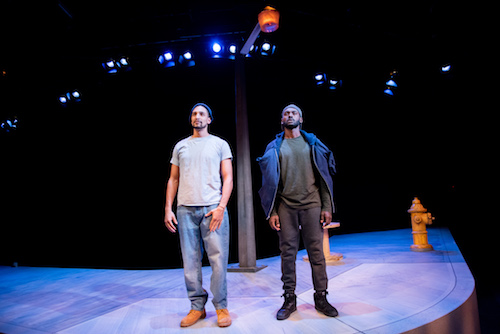 Pass Over is tense, urgent theatre, now playing in Toronto
Pass Over is tense, urgent theatre, now playing in Toronto
Antoinette Nwandu’s searing Pass Over is a riff on Waiting For Godot by way of Key and Peele, which replaces the signature tree with a streetlight and Beckett’s existentialist tramps with young black men who can’t find a way out of a perpetual cycle of racism-driven poverty and violence. The prophetically-named Moses (Kaleb Alexander) and his friend Kitch (Mazin Elsadig) dream about finally arriving at the Promised Land from their street corner.
They make Top Ten lists of what they’ll find when they reach the other side, some extravagant, some simple human pleasures they’ve been denied. They rant, pace, provide a running commentary about life…and raise their hands in fear when the police searchlight blindingly invades their space, yet again. “Do what you can,” they say, “but what can you do?”
Directed by Philip Akin in his final show for Obsidian Theatre as Artistic Director, Pass Over is an angry and urgent production with a wonderful cast. From the soft, leisurely pre-text opening that eases us into the action, to the taut, agonizing end, time stretches and tension mounts until it is almost unbearable; not boring, but apt to make one feel increasingly uncomfortable in one’s skin.
Alexander is full of signs and wonder as Moses, keener and less prone to flights of fancy than Kitch, and their de facto leader. His only hope is to survive until the sunrise. Like the original Moses controlling the Red Sea to crest at vital points, he controls waves of dialogue and moments of mental and physical anguish. He is particularly effective in an eerie moment of “self-actualization” late in the show that gives it an otherworldly quality.
Elsadig provides an excellent foil, his desperate optimism gradually waning in the face of oppression. His mimicry of the idle rich adds some welcome humour to the tense text. Neither of the characters, try as he might, seems able to reach the edge of Julia Kim’s beautiful, stark set, a street corner stretching into nothingness. The white characters, on the other hand, can enter and leave the space at will.
Alex McCooeye trades off roles as the police “Ossifer” and a lost dandified passerby, “Mister,” who comes toting a picnic basket, Red Riding Hood-style, with goodies for his ailing mother. He may be Red Riding Hood, but it’s the “wolves” before him who have reason to fear. Physically towering over the other men, he broadcasts authority, with the comfort of someone who’s always had the entire world laid out in front of him. The policeman is aggressive and violent, and the passerby studiously meek, but they are one and the same in their unthinking and immediate use of power.
The officer barks orders at a hair trigger, manhandling his prey like they’re animals. The dandy presents a more complex picture, and is therefore much more interesting than his more two-dimensional counterpart.
A commentary on white liberal guilt, he spreads out an absurdly extravagant basket of food (props by David Hoekstra) for the other men, but also a handkerchief to prevent himself from sullying his suit pants on their dirty pavement. Once he’s been thanked for his largesse, he neatly packs up everything else, satisfied he’s made a difference. Then, tripping over his own tongue in the worry that he won’t sound progressive enough, in a masterclass of stuttering, verbal tics and “Gee golly gosh,” he proceeds to lecture them on the use of the “n-word.”
This loaded word punctuates the performance, repeated over and over as a refrain by the characters, who alternately reclaim it or wield it, suffusing it with or robbing it of its power. It’s an important part of the intense discourse on ownership and identity that flows throughout the play. Other refrains, like Moses and Kitch’s “Kill me.” “Bang bang” exchange, and the latter’s list of the names and nicknames of men killed by police, become increasingly chilling the more we hear them.
Like a Shakespearian tragedy, the play has a sense of inevitability to it. Watching it leads one to wonder if a Moses will ever make it to the Promised Land. If there’s going to be a chance, unlike Beckett’s Vladimir and Estragon, we’d better stop talking in circles and get a move on.
Details
- Pass Over plays at Buddies in Bad Times Theatre (12 Alexander St.) until November 10, 2019.
- Shows run Tuesday-Saturday at 8:00PM, with Saturday-Sunday 2:30PM matinees.
- Tickets are $15-40 and can be purchased online, in person at the theatre Box Office, or by calling 416-975-8555. See website for rush ticket and PWYC information.
Photo of Kaleb Alexander and Mazin Elsadig in Pass Over by Cesar Ghisilieri
